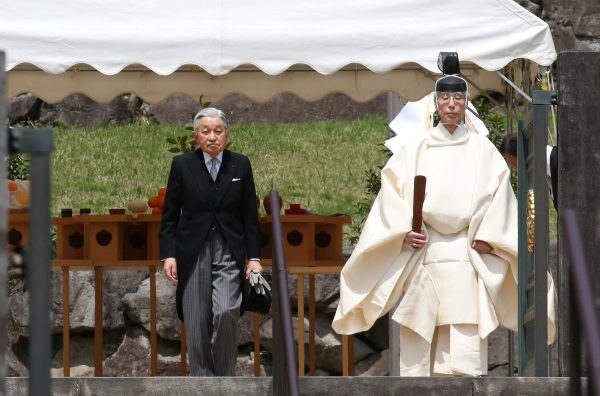As a result, Emperor Hirohito’s opinions on the crucial issues and events of his 68 years on the throne during war and peace have remained largely a mystery.
This changed with the ascendance of Emperor Akihito. To be sure, Akihito adhered strictly to his constitutionally mandated role as ‘a symbol of the state and the unity of the people’, and therefore refrained from making statements on matters of policy. Yet through his actions, choice of words and phrases, places he visited and even his body language, Akihito made it clear that he was a people’s monarch and a strong supporter of Japan’s post-war constitution.
Beyond that, he showed that he sees a role for the emperor in promoting peace, reconciliation and a Japan open to the rest of the world.
From his first press conference after becoming emperor, Akihito revealed his liberal inclinations. When the captain of the Imperial Household Agency Press Club rose to ask the first question, the Emperor interrupted, asking him to ‘please remain seated’.
The reporter, stunned silent by the unrehearsed comment, finally blurted, ‘But your Imperial Majesty, it has been decided that I should stand’.
’In that case,’ replied the Emperor, ‘Please feel free to stand’.
By asking the reporter not to ‘stand on ceremony’ the new Emperor indicated that he wanted a more relaxed and closer relationship with his people than was achieved during his father’s reign. The first half of Hirohito’s rule was defined by a statist ideology that encouraged his subjects to see an emperor as a ‘god incarnate’ — a distant yet benevolent figure who could not be looked at directly.
Post-war efforts to turn Hirohito into a people’s monarch were not entirely successful. But it was evident from that first press conference that Emperor Akihito would move quickly to shrink the distance between the imperial institution and the people.
The first change Akihito made was to the language he used in public. Unlike the strictly regulated speech of his father — it was thought that emperors should not use polite language when speaking to their subjects — Akihito chose to speak in public using normal everyday Japanese. He also used language with great care, often using a single word or expression to convey a major message.
For example, in 2015 it was reported that Emperor Akihito and Empress Michiko would visit Palau to mark the 70th anniversary of the end of World War II and pay their respects to the 10,000 soldiers killed in 1944 on the nearby island of Peleliu. On arrival, Akihito stated that he had come to remember ‘all those who had lost their lives.’
The expression, subete no hitobito (all people), was intended not only for the Micronesians present at his welcome banquet but also for audiences back in Japan. By referring to the total number killed on Peleliu as 10,000, the Japanese media had ignored the 1700 US Marines who perished in the same battle. As during his visit to Saipan 10 years earlier, Emperor Akihito made a point of paying his respects to the dead of both sides of the war.
In his farewell address on 24 February 2019, Akihito recalled that he had met many people of Japanese ancestry living in foreign countries throughout his travels. Referring to the prospect of increasing numbers of foreigners coming to Japan to augment a declining labour force, Akihito added that he hoped these foreigners would receive a warm welcome as they integrated into Japanese society.
Sometimes, Akihito’s message could be indirect, but still clear to those it was intended for. For example, in his speech two years ago requesting the Japanese government to take legal action to permit him to step down, he referred to the role of the Emperor as a ‘symbol’ 8 times in 10 minutes. On 24 February, in another short talk, he used the word five times.
Could he have been directing his message at conservative politicians making moves to rewrite Japan’s post-war constitution, the first line of which refers to the Emperor as a symbol of the Japanese nation and the unity of the people?
Akihito has often spoken about how he has given much thought in his time on the throne to how he could best fulfil his symbolic role. He often used the words kokumin ni yorisou (to stand close to the people) in how he has seen that role. But he and Empress Michiko have done more. During many visits to evacuation centres to comfort residents of areas affected by natural disasters, they got down on their knees when speaking with families who had spent days living in gymnasiums or community centres separated from each other by cardboard partitions.
Akihito’s efforts over the past 30 years to democratise the imperial institution have been met with virtually unqualified success. According to an NHK survey conducted in 2009 on the 20th anniversary of Akihito’s ascent to the throne, 85 per cent of respondents either agreed wholeheartedly or in large part that the emperor was fulfilling his constitutional role. The results of a Mainichi Shimbun survey taken this year raised the ratio to 87 per cent. Questions relating to how close people felt to their emperor also elicited high scores.
If one were to find fault with this liberal, democratic, inclusive and caring Emperor, it would be that he gives hereditary succession a good name.
Andrew Horvat is a Japan-based writer and commentator and co-editor with Gebard Hielscher of Sharing the Burden of the Past — Legacies of War in Europe, America and Asia.

